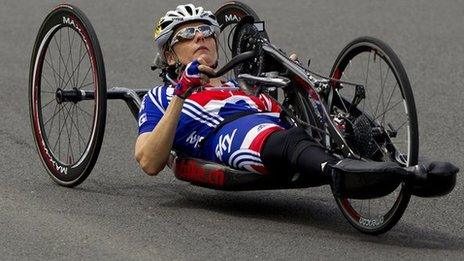Rio 2016: 'A lot of Paralympians are forgotten about'
- Published
- comments
Five British hopefuls have spoken candidly to BBC Sport about their hopes and dreams for the 2016 Paralympics in Rio de Janeiro.
Their answers may surprise. They may even shock you...
Aled Davies
The 24-year-old from Bridgend won discus gold at London 2012 and has become world champion twice in the shot put and discus since. Born without a fibula in his right leg, he is also a double European gold medallist and won silver at the 2014 Commonwealth Games.
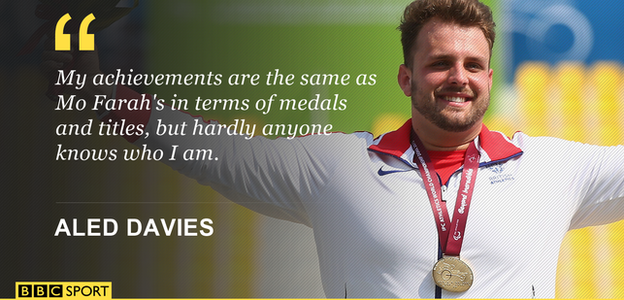
Excited about Rio? It's scary that it's so near. It's come around so fast. I haven't really set myself any targets. I'm a world record holder and a world number one, so the expectation is always there. I've already won Paralympic gold and I don't want any other colour.
Memories of 2012? London was absolutely iconic. It catapulted the Paralympic Games forward by 20 years and put it on a pedestal. Other countries are riding the wave we created.
What about the public? They don't always take time to understand a person's disability. They see someone running 'only' 11 seconds for the 100m and dismiss it, not realising they may only have the use of half their body. Or someone might throw the discus 30m and people don't realise they are paralysed from the waist down.
So what needs to happen? People need to be open-minded. When they realise what someone has actually achieved and they understand their disability, they are blown away. But I think we'll only get noticed when we start running, jumping and throwing as well as able-bodied people.
What about you? I've always wanted to be viewed as an elite athlete and I'd like to see Paralympic athletes viewed the same as able-bodied athletes. My achievements are the same as [Olympic champion] Mo Farah's in terms of medals and titles, but hardly anyone knows who I am.
Hannah Cockroft
A 23-year-old wheelchair racer from Halifax, born with cerebral palsy. Won double Paralympic gold in London, is a triple world champion over 100m, a world record holder at 100m, 200m, 400m and 800m, and won three golds - 100m, 400m and 800m - at the last World Championships.
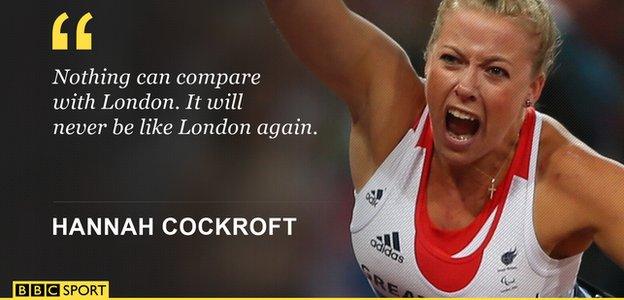
Excited about Rio? I'm a bit terrified; 2016 will be a lot different to 2012. There were no expectations on me in 2012. I was 20, competing at a home Games. People were just happy for you to be there competing. Now there will be more pressure on me, so much pressure.
Can it match London? Nothing can compare with London. It's never going to be like London again. We are not going to be able to create that hype again. The Games drew sports fans and non-sports fans. We have got to be realistic.
What about legacy? I didn't think about legacy. It was a word people were throwing around. I wasn't bothered. It started to mean something after the Games, when I went back to my training group at Leeds. Before, there were four or five people. Now there are 20 to 25, from the ages of eight to 60. It brought legacy alive for me.
So you broke down barriers? We are not just there to race and do a job, we are there to show people what's possible and give them the belief that they can do it too. At 15, when I started racing, it was so difficult to find a club and play sport. Now it's so much easier. That's all legacy.
Are you an inspiration? It feels a bit weird when people call me that. I just think I'm lucky. Some people hate their job. I just think it's a privilege to do what I do. I'm just a normal 23-year-old girl who has an amazing job. If that's inspirational, then OK, but I don't think it is.
Will Bayley
A European table tennis champion who won a silver medal at London 2012 and is currently ranked the world number one. The 27 year old from Royal Tunbridge Wells was born with arthrogryposis, which affects all four of his limbs, and also had to battle cancer as a child.
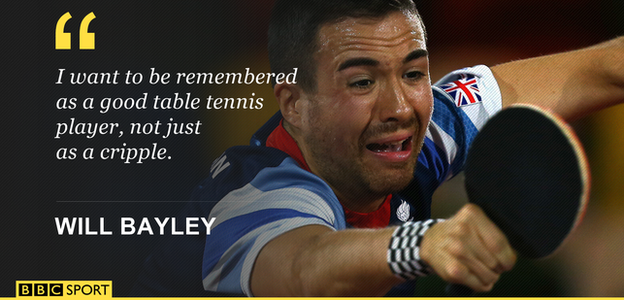
Excited about Rio? I've been thinking about 2016 ever since the 2012 Games finished. Nothing compares to a Paralympic Games for me. The way the public got behind us in London was special, it was unique. I went to the Beijing Games in 2008 and it wasn't the same.
Have public attitudes changed? A lot of people think what I do is a hobby. They don't have a clue what you go through. That's quite sad and it's quite frustrating. I'm not saying they are bad for thinking that. Some of my family, the older generation, have said that to me.
What motivates you? I just want to be recognised as a world-class athlete, not just a person who has overcome a disability. I'm a good table tennis player and I want to be remembered as a good table tennis player, not just as a cripple.
Is that what you think? I'm not stupid. I know some people think that, that it's 'nice' that people like me go out there and compete. Some people don't understand what we go through, how hard we work.
Do Paralympians get enough credit? Some do, some don't. Some are really pushed in the media. Then the public gets behind them. But there are a lot of Paralympians that are forgotten about.
Jordanne Whiley
A wheelchair tennis player who has won all four doubles Grand Slams in 2014 and added a first Grand Slam singles title in 2015. Born in Halesowen, the 23-year-old, who won a bronze at London 2012, has osteogenesis imperfecta, also known as brittle bone disease.
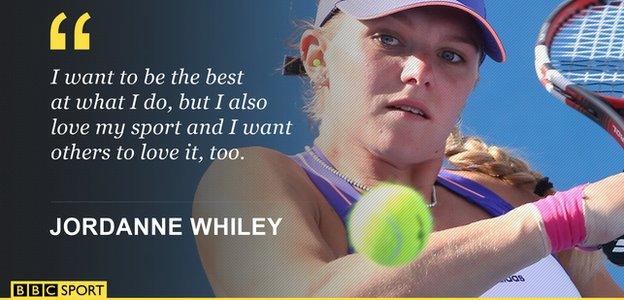
Excited about Rio? It's quite scary that it's quite close. But I've had a really good year. I've never had a year like it. This is the Games I can really excel at and can bring home two golds.
What impact did 2012 have? London completely changed people's views about Paralympic sport. We've got bigger crowds, more interest from the public, more sponsorship and more media coverage. It was about getting people to play more sport and increase awareness of disability sport. It definitely did that.
Did London inspire? I've met a lot of young children who watched me on television and started to play wheelchair tennis. I met a kid in America who had the same disability as me. He told me he had started playing tennis because of me.
What about you? I set out to inspire people. I want to be the best at what I do, but I also love my sport and I want others to love it, too. That's because I know it can change lives.
Any negatives? Some adults tell me they didn't know you could play tennis in a chair. Wheelchair tennis is not something a lot of people have heard of. If people don't know what it is and have never heard of me, it makes it hard to appeal to sponsors.
Hannah Russell
The 19-year-old partially-sighted swimmer from Chertsey has set numerous world records and become a world champion since London 2012. She is also a European gold medallist and won a silver and two bronzes at the last Paralympics, aged just 16.
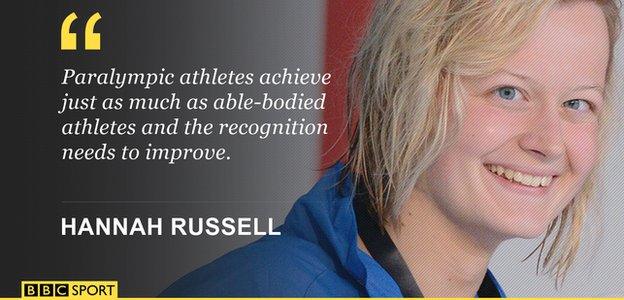
Excited about Rio? I can't wait. It's been one of my dreams since I was very young. I can't wait to see what happens. I'd love to win gold, to come away as a Paralympic champion. I've become a World and European champion. It would be the cream on the top.
What did London mean to you? London was something that will stay with me forever. Nothing will ever match it. It was something very special. But I know Rio will put on a great show, both for the country and the whole world. I can't wait to see what they produce. I hope they pull it off.
And legacy? That's been huge. I remember people telling me how much more they had enjoyed the Paralympics than the Olympics. I remember children coming up to me and going: 'Wow.'
What about recognition? Lots of people are watching and taking an interest in us now. But people like Jordanne need a lot more recognition. Paralympic athletes achieve just as much as able-bodied athletes and the recognition needs to improve.
How will Britain get on in Rio? The amount of talent coming through is quite special to see. It's going to be something very big in Rio and I know Rio will put on a great show for the whole world. I can't wait to see it.
- Published7 January 2016
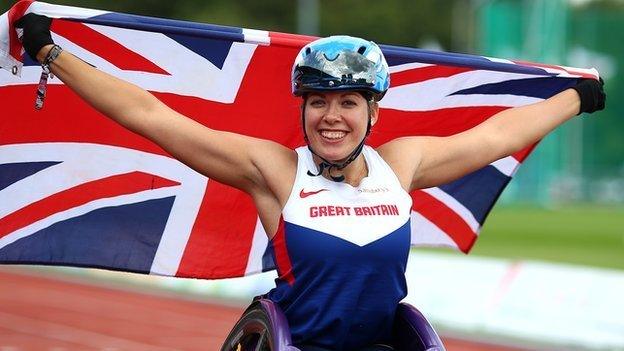
- Published7 January 2016
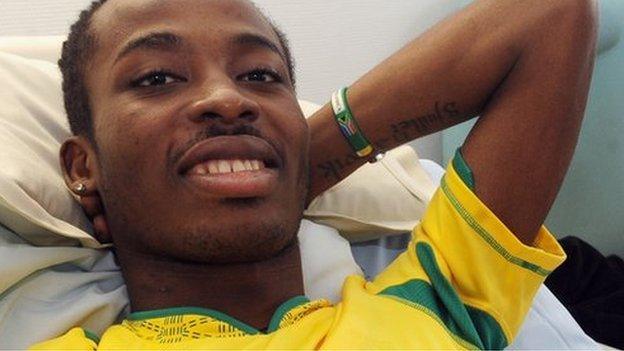
- Published5 September 2016
